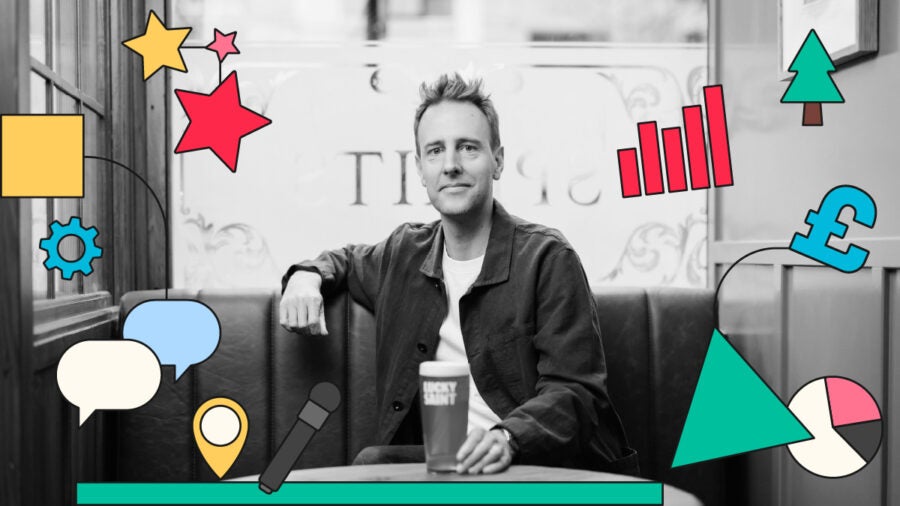
Luke Boase is the founder of non-alcoholic beer brand Lucky Saint. With sober socialising becoming increasingly popular, particularly among gen Z consumers, Boase sees an opportunity to capitalise on an evolving market.
Here, he gives his take on leadership, motivation, work-life balance – and more.
What do you think makes a good leader?
Broadly, it’s about knowing your strengths and weaknesses, then building the right team around you. I’ve got the core ideas, but as the business evolves it’s important I have new expertise available to me, to help me build on them.
What single thing do you think would make your job easier?
It comes down to hiring the right people and shaping the right team. If everyone is pulling in the same direction, if everyone is doing their bit, then that makes my day easier. Plus, it frees up time and headspace for me, knowing that I can trust the others around me.
This sort of thing doesn’t happen overnight. Team spirit is a long-term concept that you’ve got to work at.
What advice would you give to your 18-year-old self?
My advice would be to do something you’re passionate about. The reality is that we spend something like 40 or 50% of our lives at work. If you’re going to do something every day, if you’re going to go into the office or sit at your desk for that proportion of your time, then you at least owe it to yourself to enjoy it. Indeed, it’s really hard to be good at something if you’re not passionate about it.
What do you consider to be the biggest challenge in business right now?
Well, through a Lucky Saint lens, I’d say it’s being a small-scale brand. We live on limited resources and finances. Our challenge at the moment is one of prioritisation; we can’t necessarily do everything we want, so we’ve got to think about doing what we can do really well.
A key issue for us is raising the awareness of our brand. Historically, the alcohol-free category has suffered from low visibility. Previously, it was the case that non-alcoholic or low-alcohol beer lived on the bottom shelf of a fridge in the pub or on the bottom shelf in the supermarket. It’s our hope to change that. We’re working on a range of campaigns to try and engage customers and raise the profile of Lucky Saint. I think there’s certainly less stigma now, but we’re working on making sure we’re seen in the right places, namely on draught.
Which book do you think every business leader should read at least once?
I think every founder or leader at a startup or scale-up should read Shoe Dog, which is the autobiography of Nike founder Philip Knight. It’s an important reminder that any brand, even these giant global corporations, did not start out that way.
It’s a great book that shows all of the twists and turns that Nike took on its road to becoming such an iconic brand. People forget that Nike was really pushed to the brink in the 1990s. I find it reassuring to know that even a company like Nike had to weather a storm. It’s a great read about resilience.
What was your first job?
I worked for a production company called Academy, which specialised in advertising. That was pretty cool, working with big brands like Guinness.
What was your worst job?
Ah, I don’t think I’ve had a worst job as such. I’ve probably got a few war stories that I’ve learned some valuable lessons from, but I don’t think I’d necessarily say this was because a job itself was bad.
What’s the best piece of business advice you have received?
The best piece of advice I’ve received, by an absolute country mile, was to only do the things you can do. This was told to me by Richard Reid, who iss one of the founders of Innocent Drinks. As a mantra, I find it really helpful, particularly as a founder.
As well as being a reminder of your own skills and strengths, it’s also a reassurance that it’s OK to ask for help with something that you can’t do. If you stick to the things you can do, and do them well, then you can feel proud of that. You don’t have to beat yourself up about not being able to do something, especially when you can reach out for help.
What excites you most about your current role?
I love the fact it changes every six to nine months. That’s the nature of a start-up or scale-up. The landscape constantly changes and the business evolves. Priorities change and new people with new ideas join the business. I’m always finding a new reason to fall in love with this company. I’m never able to stand still and that’s the way I like it.
Finally, what do you do to protect yourself against burnout?
Sometimes a change can be as good as a rest. Even if you are still attached to your work – checking emails, answering calls or whatever – it is important that you do those in a different setting. Getting away helps.
I think it’s also really important to retain the perspective of what really matters and what doesn’t; making time for friends and family is crucial. As for hobbies and interests, well, obviously non-alcoholic beer! I also like cycling, skiing and any sort of sport or activity which gets me outdoors in the fresh air and and in big open spaces.

Luke Boase is the founder of non-alcoholic beer brand Lucky Saint. With sober socialising becoming increasingly popular, particularly among gen Z consumers, Boase sees an opportunity to capitalise on an evolving market.
Here, he gives his take on leadership, motivation, work-life balance – and more.




